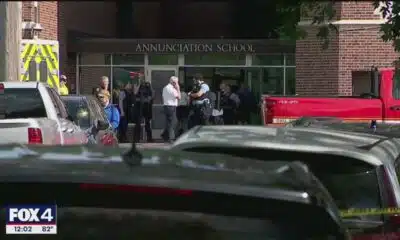News from the South - South Carolina News Feed
Wall Street holds steady just below recent records
SUMMARY: Stocks hovered near recent highs Tuesday morning as the S&P 500 remained steady, the Dow dipped 0.1%, and the Nasdaq rose 0.2%. Boeing gained 2.2% after Korean Air’s $50 billion aircraft deal, while EchoStar surged 77% following AT&T’s $23 billion spectrum purchase. Treasury yields were mostly unchanged. Market caution followed President Trump’s intensified conflict with the Federal Reserve, including his attempt to remove Governor Lisa Cook. Despite political pressure, the Fed is expected to cut interest rates in September amid concerns over inflation, tariffs, and a weakening job market. Consumer confidence slightly declined, and global markets fell.
Read the full article
The post Wall Street holds steady just below recent records appeared first on www.abccolumbia.com
News from the South - South Carolina News Feed
At least five children injured in a shooting at a Minneapolis Catholic school
SUMMARY: On August 27, 2025, a shooting at Annunciation Catholic School in Minneapolis injured at least five children during the first week of classes. Authorities contained the shooter, and no active threat remained. Governor Tim Walz called the incident “horrific” and expressed prayers for those affected. Children’s Minnesota and Hennepin Healthcare treated the injured. The school was evacuated, and families were directed to a reunification zone. The shooting followed multiple fatal shootings in Minneapolis within 24 hours and came amid a wave of hoax shooting calls on U.S. campuses. President Trump and local officials monitored the situation closely.
Read the full article
The post At least five children injured in a shooting at a Minneapolis Catholic school appeared first on www.abccolumbia.com
News from the South - North Carolina News Feed
Spending on classrooms by NC teachers among highest in US
Teacher pay has been a long and storied battle in North Carolina, with the state consistently ranking among the lowest teacher salaries in the country. But while educators are often pinching pennies and stretching dollars to make ends meet, a new report from CouponBirds shows North Carolina teachers are spending an average of $1,632 out of their own pockets to supply their classrooms.
That’s the second-highest in the country according to the study, just $5 less than Pennsylvania teachers. It’s a 22% increase from the average amount NC teachers spent in 2024 and is well above the report’s national average of $1,021.
President of the North Carolina Association of Educators Tamika Walker Kelly told Carolina Public Press that teachers tend to spend the most money on consumable products like notebook paper, pencils, tissues and cleaning wipes. While many teachers will ask parents to purchase these supplies for their children — or even for communal use — at the beginning of the school year, Kelly noted that families are often experiencing economic hardships themselves.
[Subscribe for FREE to Carolina Public Press’ alerts and weekend roundup newsletters]
“Educators stand in the gap most of the time to provide resources for students and families who cannot afford them,” she said. “And we have to turn over those resources throughout the year — not just at the beginning of the year, but throughout the duration of the academic season.”
It’s a national trend for teachers to post their “classroom wishlists” online in hopes good Samaritans will purchase some of the items. Kelly said crowdfunding for supplies is nothing new to NC teachers, but it has become more routine as resources have shrunk.
“Unfortunately, that has become more commonplace, but it shouldn’t be because we need our North Carolina legislators to invest in the basic resources that our students need in order to thrive,” she said.
“We should not be dependent on crowdfunding our classrooms when we have a constitutional obligation to make sure that every student has the resources that they need here in our state.”
In the wake of slimmed budgets and decreased resources, teachers often have to get creative to make ends meet in the classroom.
Kelly told an anecdote of a teacher who cut composition books in half to double the amount of notebooks she was able to distribute to her students. A more common hack is to wrap a rubber band around hand sanitizer dispensers. This limits the amount that comes out of the bottle, prolonging the bottle’s life span, Kelly said.
Many educators already work second jobs to pay for their supplies each year or simply to sustain their lifestyle, Kelly said. Additionally, teachers can also be parents who have to purchase supplies for their own children on top of stocking their classroom.
“For our educators to be spending as much money as they do to supply their own classrooms, in contrast to the data that shows that we are one of the lowest-paid states in the nation for educator pay really highlights the dissonance and the really deep investments in care that our educators take into putting into their classroom versus the lack of care that our lawmakers are putting in to making sure that we continue to retain these educators,” she said.
Finding solutions for classroom spending
Madeline Blobe is the executive director of the Chapel Hill-Carrboro Public School Foundation, a nonprofit that raises additional funding for schools in the area.
The organization funds scholarships, innovative projects and teacher awards, as well as offering a Teacher Supply Store for educators to “shop” for classroom supplies. They work closely with the East Chapel Hill Rotary Club, which does 85% of the fundraising for PSF each year.
The supply store is meant to defray some of the financial burdens teachers face when it comes to stocking their classrooms by spending out of their own pockets, Blobe said. This year, more than 1,100 teachers in the district will be able to “purchase” $50 worth of supplies from the store for free of charge. Available items range from two composition books for $1 to an electric pencil sharpener for $30.
“If you’re at the store, you feel it — what this means to teachers, how happy it makes them all. It seems like a little thing, but it really is a big thing to them,” Blobe said.
“They’re obviously devoted to their jobs or they wouldn’t come to work. They have very hard jobs. They’re not paid well. It’s obviously a passion for them, but it is definitely the generosity of our community that means a lot.”
Although PSF is a nonprofit organization and cannot lobby for legislation or political causes, Blobe said she does feel it is her responsibility to keep her donors and community informed about the state of education resources.
While generosity from the community is something teachers undoubtedly appreciate and sometimes even depend on, it is ultimately the state’s responsibility to fund public schools and ensure access to a quality education, Kelly said.
That starts with investing in students and increasing the access educators have to resources, as well as raising teacher pay for both new and veteran teachers, she said.
“We believe that dual investment, both in the overall funding of our public schools but also investing in comprehensive educator pay increases, will help us address this issue so that we don’t continue to face it in the future,” Kelly said.
National trends
Executive Director of AdoptAClassroom.org Ann Ruhr Pifer said the organization was designed to relieve the burden of teachers spending out of their own pockets. In North Carolina, 766 teachers are currently seeking support from the organization, which supplied 680 classrooms during the 2024-2025 school year.
Teachers create a page on the website detailing their classroom needs and what they hope to spend any donated funds on. Donors can decide to donate to individual teachers, a school or directly to AdoptAClassroom.
Any donations that a teacher receives goes into an account managed by the organization and can only be spent on an e-commerce marketplace containing educational and office supplies vendors. No money changes hands, and items are shipped directly to the teacher’s school.
Similarly to PSF, AdoptAClassroom sees its role as meeting the immediate needs of teachers across the country. But it’s not about simply choosing to focus on charity or legislation, Pifer said.
“Today, those funds can get right into the classrooms. Changing public education funding is a bigger issue,” she said. “And when I’m talking to potential donors or speaking to groups, I always say it’s not an ‘either, or’ — it’s a ‘yes, and.’”
Since the COVID-19 pandemic, AdoptAClassroom saw increased awareness from donors and teachers alike. Pifer said she thinks the pandemic drew attention to how much teachers do, so people felt more inclined to offer help. But teachers also struggled more and sought additional support.
AdoptAClassroom has conducted its own studies on teacher spending, and it found that teacher spending has increased 50% in the last 10 years. It’s clear that the burden has increased for teachers, and many are concerned that inflation is playing a role, Pifer said.
Not only does inflation impact the price of items directly, but it creates a domino effect across school districts.
“In talking to school principals, I realized that it also has a significant indirect effect. So inflation, and cost increases driven by many things, is increasing the cost of janitorial supplies, services that the school depends on, supplies and services just to run the school,” Pifer said.
“So now the principal’s budget is strained too, and maybe they used to be able to give teachers $200 for classroom supplies. Maybe now they can only give them $100 or maybe nothing. It may be gone, because the inflation pressure on the school budget is significant.”
A viral video recently sparked controversy when a parent voiced concerns online about her experience at her child’s teacher’s classroom at an open house. She was underwhelmed by the classroom, specifically the empty bins and lack of a rug.
Teachers responded in droves, explaining how they are largely expected to supply and decorate their rooms by spending their own time and money. So while many teachers are focused on essential supplies, there is often still an expectation for a decked-out classroom.
Blobe said decorative items, like soft lighting fixtures and posters, tend to fly off the shelves quickly at the Teacher Supply Store when they are lucky enough to have them available. Teachers also like to purchase items like rugs or comfortable seating options through AdoptAClassroom, Pifer said.
Kelly said she is concerned about the increasing financial burden on teachers contributing to teacher burnout. Some teachers are getting to a point where they have to make tough decisions and opt not to stock their classrooms by spending as heftily as they typically would, she said.
In the worst cases, teachers are leaving the classroom entirely. Sometimes they’ll leave to work for education-related companies where they can still utilize the same skills. Other times, they’ll step away from education altogether. Kelly cited the “educator to real estate pipeline” as one example.
“Many educators are choosing to leave the profession or are being pushed out of the profession because it is no longer sustainable for them and their families, and that is why we are continuing to deal with the educator shortage here in North Carolina,” she said.
“And until it is adequately and properly addressed through the North Carolina General Assembly, we’ll continue to see educators be pushed out of a career that they love to do, into the private sector, or into other states that compensate their educators more.”
This article first appeared on Carolina Public Press and is republished here under a Creative Commons Attribution-NoDerivatives 4.0 International License.
The post Spending on classrooms by NC teachers among highest in US appeared first on carolinapublicpress.org
Note: The following A.I. based commentary is not part of the original article, reproduced above, but is offered in the hopes that it will promote greater media literacy and critical thinking, by making any potential bias more visible to the reader –Staff Editor.
Political Bias Rating: Center-Left
This content emphasizes challenges faced by public school teachers, particularly low pay and the burden of self-funding classroom supplies, while advocating for greater state investment in education. It highlights systemic issues and includes calls for legislative action to increase funding and teacher salaries, which aligns with center-left perspectives prioritizing public sector support and social investment. The tone is sympathetic to educators and critical of insufficient government funding, but it remains measured and fact-based without heavy partisan rhetoric.
News from the South - North Carolina News Feed
Omnibus elections bill still simmering in NC legislature
You Can Vote executive director Kate Fellman breathed a sigh of relief when a bill effectively banning voter registration drives died earlier this legislative session after bipartisan pushback. But now, one of a multitude of provisions in the latest version of this year’s elections omnibus bill would do the same thing, albeit in a different way.
The omnibus bill would require registrants to provide their full Social Security number on their voter applications. Under current law, applicants have an option between giving the last four digits of their Social Security number or their North Carolina driver’s license number.
This session’s elections bill began as a “correction to the rush job” the legislature passed last year after the elections, Senate Bill 382, said Mark Swallow, an advocate for left-leaning Democracy Out Loud. Last year’s bill tightened ballot counting and curing deadlines, amongst other election changes, while this year’s bill loosens them a bit.
[Subscribe for FREE to Carolina Public Press’ alerts and weekend roundup newsletters]
However, as the session progressed, it quickly became a grab bag for the Republican majority’s election priorities.
While much of the legislature’s policy work is paused until next year, the elections omnibus is on a different timeline. It may see movement as early as September, according to bill sponsor Rep. Hugh Blackwell, R-Burke.
In Swallow’s view, it’s come a long way, but still has a ways to go.
And in an increasingly uncommon move in North Carolina’s GOP-led legislature, Blackwell is taking in everyone’s feedback on the omnibus before moving forward.
Social Security number, please
Fellman does a lot of voter registration as part of You Can Vote, a civic organization focused on voter education and empowerment.
She already hears concerns about the security of providing the last four digits of registrants’ Social Security numbers. Some of the younger registrants don’t know their number offhand, and have to call or text their parents to get the information, which raises further security issues, she added.
“Nobody would give (their full SSN) to a stranger just out on the street,” Fellman said. “… I just don’t know how you could actually do paper voter registration form collection.”
Jim Womack, president of the conservative North Carolina Election Integrity Team, said having a full Social Security number, as the omnibus would require, would make list maintenance easier, as the only true unique data point among voter registrants.
NCEIT is a chapter of the Election Integrity Network, founded by former Trump lawyer Cleta Mitchell. Mitchell helped Trump in his failed bid to overturn the 2020 election. Now Rep. Pricey Harrison, D-Guilford, and several others think North Carolina lawmakers are following her election policy playbook.
Womack, for his part, said providing a full Social Security number is no more dangerous than providing any other information at a voter registration drive.
“If it’s the full Social, they’ve got to protect it the same way they do the last four (of the SSN) or the driver’s license number, because both of those are protected as well,” he said. “So I mean, there’s always risk in allowing voter registration drives.”
‘How it should be’
At a late June House Election Law committee meeting, Harrison posed a concern to Blackwell about a provision of the omnibus bill that would have barred boards of election from “encouraging or promoting voter turnout in any election.”
The provision seemed “a bit vague” to her. Didn’t they want the county boards to encourage turnout? Wasn’t part of their job to promote voting?
Blackwell assured Harrison that there was more work to do on the bill before it was ready for a vote.
“The idea is that we want the State Board to focus on the conduct of the election, and that the responsibility for turnout is better handled by other folks,” he said. “We were trying to draw a line, and we may not have gotten it just at the sweet spot.”
The next time the omnibus bill was heard in committee, the turnout provision was axed. And instead of moving straight from the elections committee to rules, where the bill would have likely been expedited to a floor vote, the bill was assigned an additional committee hearing.
After that committee meeting, where Harrison raised other concerns, Blackwell’s staff emailed her to ask further questions. While Harrison still has a list of issues with the omnibus bill, she gave credit to Blackwell for being amenable to changes, and giving the bill time to improve.
“I’d rather them do it out in the open, in a committee, than to go into a back room and figure out what’s going to work,” she said. “This is actually a better, more public process. This is how it should be.”
The omnibus bill has undergone a number of other changes since its debut.
Instead of offering State Board of Elections Executive Director Sam Hayes the ability to make 25 political hires — which he said were needed to ensure “ the folks that are surrounding me, certainly my direct reports and I, are aligned on the vision for the agency” — the latest version gives him five positions.
An initial campaign finance provision limiting foreign nationals’ ability to contribute to referendum committees has turned into a broader ban on foreign national contributions for any candidate, political committee, party or treasurer.
The latest version officially takes back the ability of so-called “Never Residents” to vote in state elections, in line with recent court rulings, and limits the acceptable photo ID documents for overseas and military voters.
And of course, it changes some deadlines.
‘Humanly not possible’
Last Election Day, the Wake County Board of Elections received 4,800 absentee ballots before the 7:30 p.m. cutoff.
Staff checked ballots, conducted data entry and reviewed the voter and two required witness signatures on each envelope before adding them to the tally.
If last year’s Senate Bill 382 had been in effect, Wake County’s count would have begun at 5 p.m. on Election Day and run continuously until there were no ballots left, with no leaving the room allowed, except in case of an emergency.
That would have meant spending one or two nights in the office, Wake County Board of Elections Democrat Gerry Cohen said. It wasn’t a realistic ask.
Last year’s bill also moved up deadlines for counting and curing provisional and absentee ballots. Before its passage, county elections staff had until the day before county canvass, nine calendar days after the election, to count and cure all the ballots. Senate Bill 382 gave staff just three business days after the election to do so.
This year’s omnibus bill takes it back — kind of. It would give election officials five business days after the election to complete the job.
Lee County Board of Elections Republican Jay DeLancy, who founded the right-leaning Voter Integrity Project, said the deadlines set under SB382 were “humanly not possible” without a hiring surge.
As an election integrity advocate, DeLancy liked the idea of the count being “continuous,” but as a board member, his perspective has shifted slightly.
“The things election integrity people like me have been complaining about were not all put there for nefarious purposes,” he said. “Now we’re having to see, oh, it was done for a pragmatic purpose, just so we have time to count them.”
However, DeLancy wants stronger penalties for those who share ballot count results before the polls close to avoid any possibility of fraud.
What else is in the omnibus bill?
North Carolina absentee voters must attach a copy of their photo ID to their ballot, and either get two witnesses or a notary to sign the envelope.
Last year, the State Board of Elections was supposed to try a third security measure — signature verification — but the pilot program never quite got off the ground due to issues finding an acceptable vendor.
Signature verification requires the use of a machine to detect whether a voter’s signature belongs to them. If North Carolina implemented it through the omnibus bill, it would be the only state to require three security measures for absentee voters.
Hayes’ chief of staff Brian LiVecchi told lawmakers they’ve discussed potential vendors to avoid and seek out with other states. The pilot program wasn’t made a priority under the previous State Board of Election administration, he said. They would like to change that.
Harrison isn’t a fan of the idea.
“They’ve been wanting to go down this road for a while, but we know that there’s a long history of folks getting thrown out because of their signature,” she said. “And anybody who’s watched their signature change from age 18 to 40 or to even 80. I mean, nothing looks the same.”
Hayes, who worked in the legislature as House Speaker general counsel until a few months ago, has fingerprints all over the elections omnibus bill.
Besides the signature verification piece, Hayes was clear that securing positions exempt from the North Carolina Human Resources Act, which bans political hiring and firing, was a top concern. Under the current bill, the State Board would also be able to hire private counsel for legal matters, removing the Democratic attorney general from the picture and shielding any documents from the public records law.
Swallow trains elections workers, and he said these provisions violate one of his golden rules.
“One of the things we tell our poll workers is that the only people that can be partisan in our elections are the candidates, and that’s changing with this bill,” he said.
Even bipartisan sections of the elections omnibus bill face obstacles. The provisions attempting to block foreign influence in elections and campaign finance aren’t quite across the finish line yet, according to Womack.
“They’re struggling to find language that would allow them to restrict referendums or foreign funding of referendums and that sort of thing without infringing on First Amendment rights,” Womack said.
No language change is going to be effective unless the legislature repeals two recent laws that make it easier to cover up the origins of funds, Harrison said.
And some of the omnibus bill’s provisions don’t do anything at all, except maybe send a message, Cohen said.
The omnibus bill bans ranked choice voting, a process by which voters rank candidates instead of choosing just one, and no winner is crowned until they earn a majority. The election method is lauded by supporters for producing more moderate consensus winners and criticized by opponents for being too confusing for voters.
But ranked choice voting already doesn’t happen in the state, and it would take express permission by the legislature for any localities to allow it. Laws that allowed ranked choice voting experiments in Cary and Hendersonville years ago have expired, Cohen said.
A ways to go on omnibus
Fellman is concerned about the timeline. If the elections omnibus becomes law, most of it goes into effect Jan. 1, 2026. That’s just a few months before the 2026 primary election, which isn’t much runway to implement changes and educate voters, she said.
There will likely be legal challenges, which may make things murkier, she added.
At the end of the day, House Democrats have a leg — or seat — up. If they decide they’re not satisfied with the bill, they can block a veto override. Generally, Democrats tend to stick together on election matters, Harrison said.
Swallow isn’t so confident after swing Democrats have sided with Republicans on several veto overrides so far this session.
“There are things in this bill that fix issues, like the curing of ballots timeframe,” he said. “But I hope that doesn’t convince Democrats that this is something they should be voting for.”
This article first appeared on Carolina Public Press and is republished here under a Creative Commons Attribution-NoDerivatives 4.0 International License.
The post Omnibus elections bill still simmering in NC legislature appeared first on carolinapublicpress.org
Note: The following A.I. based commentary is not part of the original article, reproduced above, but is offered in the hopes that it will promote greater media literacy and critical thinking, by making any potential bias more visible to the reader –Staff Editor.
Political Bias Rating: Center-Left
The content presents a detailed examination of election-related legislation with a focus on concerns raised by voting rights advocates and Democrats, while also including perspectives from Republicans and conservative figures. It highlights potential negative impacts of the Republican-led bill on voter registration and election administration, emphasizing issues like voter access and election integrity from a critical standpoint. The inclusion of critiques about Republican priorities and the framing of certain provisions as restrictive or problematic suggests a center-left leaning, aiming to inform readers about the implications of the legislation with a slight emphasis on protecting voter rights and transparency.
-
News from the South - Arkansas News Feed6 days ago
New I-55 bridge between Arkansas, Tennessee named after region’s three ‘Kings’
-
News from the South - Texas News Feed4 days ago
DEA agents uncover 'torture chamber,' buried drugs and bones at Kentucky home
-
News from the South - Missouri News Feed6 days ago
Missouri settles lawsuit over prison isolation policies for people with HIV
-
News from the South - Louisiana News Feed7 days ago
Families with citizen children deported by ICE sue Trump administration
-
News from the South - Georgia News Feed7 days ago
Bookman: Here’s how Georgia’s 2020 election crisis will factor into 2026 GOP campaigns for governor
-
Our Mississippi Home6 days ago
Vardaman: The Sweet Potato Capital Serving Up Love, Tradition, and Flavor at Sweet Potato Sweets
-
Local News5 days ago
Florida must stop expanding ‘Alligator Alcatraz’ immigration center, judge says
-
News from the South - Virginia News Feed6 days ago
Erin: Tropical storm force winds 600 miles wide eases into Atlantic | North Carolina










































